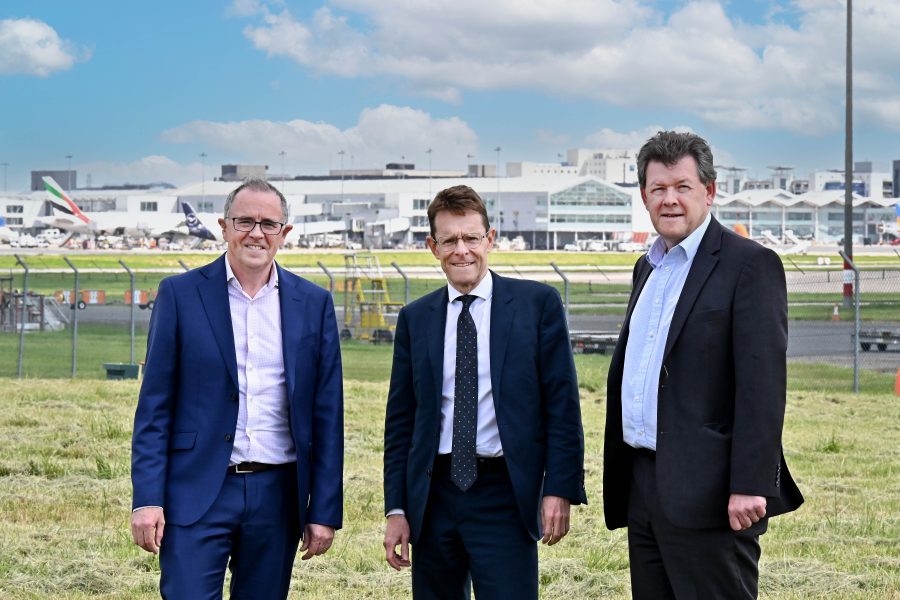News:
Birmingham Airport and ZeroAvia explore plans for renewable hydrogen production
Progress continues towards zero-emission passenger flights as initial concepts were revealed today for the creation of a hydrogen production facility at Birmingham Airport (BHX).
To realise this dream, early-stage concepts are being developed jointly by ZeroAvia, the hydrogen-electric aircraft developer, and BHX for on-site hydrogen production aircraft refueling facility, with the potential for multi-modal applications.
An area of land with access to the BHX airfield and the local road network has been earmarked as a suitable location for the facility. On-site solar power is being considered as a source of renewable energy to produce hydrogen.
Subject to funding, planning and regulatory permissions being secured, the ambition would be to use the pioneering plant to support early flight demonstrations, and also refuel road vehicles, potentially including local buses. In advance of this, BHX has commenced talks with a major automotive company about trialing hydrogen buses and cars on its airfield.
Analysis by ZeroAvia suggests a 3MW hydrogen production facility could produce 365 tonnes of hydrogen annually (1 tonne per day), potentially supporting 1,250 regional flights and 3,000 buses or trucks per annum, with the remaining 250 kg per day of hydrogen production capacity being used for industrial purposes.
Andy Street, Mayor of the West Midlands, said on visiting the site: “There is the seed of an idea here – with the ambition and creativity of the ZeroAvia team working with Birmingham Airport clear to see.
“Our region is leading the way in tackling the climate emergency – not least with our #WM2041 net zero commitment – so it’s the right time for us to be at the forefront of this effort to decarbonise flight journeys.
“I look forward to this initiative bearing fruit in the months and years ahead. If this dream becomes a reality, we will all benefit.”
Arnab Chatterjee, VP, Infrastructure, ZeroAvia, said: “Our ambition is bold but attainable. We have proven the concept of hydrogen-powered flights and are on a clear pathway to commercial adoption. Technologies are advancing fast as we progress with expanding to larger aircraft over longer distances. Before the end of this decade, we believe hydrogen as a fuel source for vehicles and aircraft will be an accepted norm.”
Simon Richards, Chief Finance and Sustainability Officer for BHX, said: “While we are still at a very early stage, it is important to communicate this vision so people can see what is coming and the benefits to the wider community. This is a game-changing prospect underpinned by a steely determination to decarbonise and protect the future of our planet for future generations.”
In January of 2023, ZeroAvia carried out successful test flights at its base in Kemble, Gloucestershire, using a 20-seater aircraft powered by a hydrogen-electric engine. ZeroAvia plans to certify its ZA600 system for this size of aircraft by 2025, while looking to certify engines for up to 80 seat aircraft by 2027. Hydrogen fuel cells generate electricity which then powers electric motors to turn the aircraft’s propellers. The only emission is water vapour.
ZeroAvia is currently working on bringing to market a zero-emission system capable of flying 20-seat aircraft 300 nautical miles by 2025.
This opens up the possibility of green air travel from Birmingham to destinations such as Edinburgh, Glasgow, Aberdeen, Belfast, Isle of Man and Dublin by the middle of this decade.
In a move that would make zero-emission travel to Mediterranean holiday destinations a reality, ZeroAvia is aiming to get an emissions-free 80-seat aircraft flying up to 1,000 nautical miles by 2027.
For BHX, the partnership with ZeroAvia sits alongside its own journey to become a net-zero-carbon airport by 2033, as outlined in its ‘carbon roadmap’* published in 2022.
